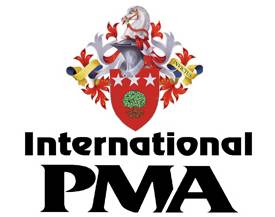Consolidation of Theoretical Knowledge and Practical Skills Training
Description
The registered nurse will review the comprehensive review of their current level of skills competency carried out earlier and build upon areas of knowledge and skill deficit. This will give the practitioner the confidence to face future challenges head on.
| Element | Criteria |
| 1. Self assessment Review | 1.1 Self assessment review of skill deficit 1.2 Development of underpinning knowledge deficit profile |
| 2. Presentation and teaching skills development | 2.1 Present information to peer 2.2. Teach a skill |
| 3. Evaluation for future practice | 3.1 Develop areas of knowledge and skill deficit 3.2 Review possible employment options |
Module breakdown
This module is broken down into the following components :

This module will integrate with other modules in a cohesive manner to optimise learning and highlight the relationship of all the units from this program. The foundation of this module will be the evaluation of competence where practitioners are able to explore areas of development to enhance future practice. This will be by way of a profile of both skills and knowledge to be developed.
Practitioners are expected to come prepared with the self assessment completed in order to develop the deficit profile.
In particular this module will create a foundation of presentation and teaching skills required of the more senior staff in a healthcare institution. Therefore the assessment strategies will focus upon these elements of practice development.
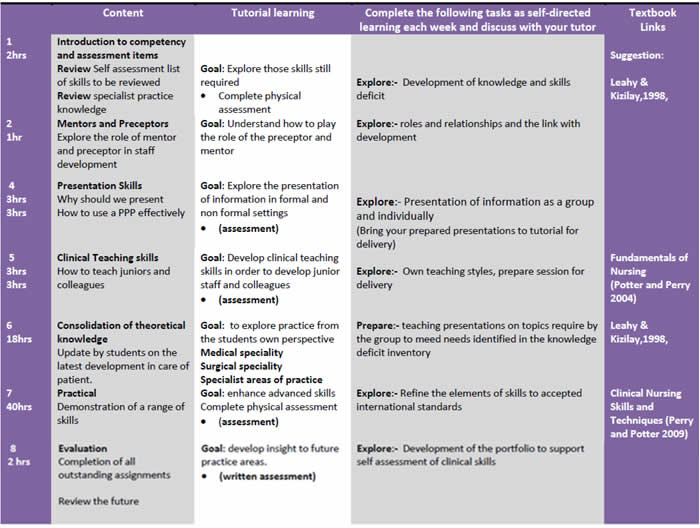
Reading list
| Co – requisites | Nil |
| Pre –requisites | Evaluation of Competence module |
| Recommended Texts | Leahy, J.M. and Kizilay, P.E. 1998, Foundations of nursing practice, W.B. Saunders. Potter P and Perry A 2004 Fundamentals of Nursing, Mosby; 6th edition Perry A and Potter P, 2009, Clinical Nursing Skills and Techniques, Mosby Jarvis C, 2007, Physical Examination & Health Assessment, Saunders; (5th edition) |
Assessment Tasks
| Name of Assessment Task: Presentation | |||
| Purpose of Assessment Task: Enable practitioners to present information in a formal and non formal setting |
|||
| Evidence provided by: Presentation notes Peer assessment for group presentation Tutors evaluation |
|||
| Pass | NYC | Date | Signature |
| Name of Assessment Task: Teaching | |||
| Purpose of Assessment Task: Enable practitioners to teach as skill or knowledge element to peers |
|||
| Evidence provided by: Peer evaluation Teaching notes Tutors evaluation |
|||
| Pass | NYC | Date | Signature |
| Name of Assessment Task: Written Test | |||
| Purpose of Assessment Task: Enable practitioners to demonstrate knowledge over a variety of nursing areas |
|||
| Evidence provided by: Test paper completed in the timeframe. |
|||
| Pass | NYC | Date | Signature |
| Name of Assessment Task: Practical Test | |||
| Purpose of Assessment Task: Enable practitioners to demonstrate skill over a variety of nursing areas This will include physical assessment of a patient. |
|||
| Evidence provided by: Clinical skills assessment checklist from skills completed in the timeframe. |
|||
| Pass | NYC | Date | Signature |
Assessment Coding
Pass = Competent
NYC = Not Yet Competent
Professional standards of practice
- SNB code of conduct
- SNB code of ethics
Date of Submission = End of module
Evaluation of Competence
Description
The registered nurse will be introduced to the concept of self assessment to enable them to complete a comprehensive review of their current level of skills competency through a range of general and specialist areas of practice.
| Element | Criteria |
| 1. Self assessment techniques | 1.1 Understand the concept of self assessment 1.2 Understand the documentation involved |
| 2. Self assessment skills review | 2.1 Use the documentation to review current practice over different areas 2.2 Use a variety of assessment inventories |
| 3. Evaluation for future practice | 3.1 Understand the role of reflection and critical thinking 3.2 Reflect on current practice to create a portfolio 3.3. Draw a plan of skills to be achieved in the future |
Module breakdown
This module is broken down into the following components :

Practitioners are expected to come prepared with the self assessment exercises completed as required. This module will integrate with other modules in a cohesive manner to optimise learning and highlight the relationship of all the units from this program. In particular this module will create a foundation for the final module Consolidation of Knowledge and Practical Skills Training.
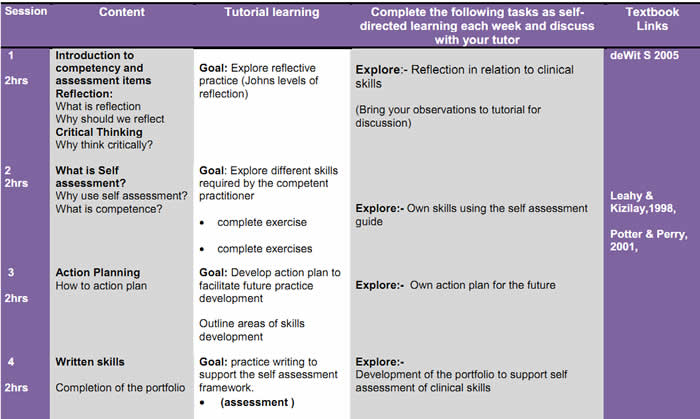
Reading list
| Co – requisites | Nil |
| Pre –requisites | Nil |
| Recommended Texts | Leahy, J.M. and Kizilay, P.E. 1998, Foundations of nursing practice, W.B. Saunders. deWit S, 2005, Fundamental concepts and skills for nursing, (2nd Edition) Elsevier Saunders, Philadelphia |
Assessment Tasks
| Name of Assessment Task: Presentation | |||
| Purpose of Assessment Task: Enable practitioners to present information in a formal and non formal setting |
|||
| Evidence provided by: Presentation notes Peer assessment for group presentation Tutors evaluation |
|||
| Pass | NYC | Date | Signature |
Assessment Coding
NYC = Not Yet Competent
Graded Competency (GC)
CP = Competent achieved with a pass
CC = Competency achieved with a credit
CD = Competency achieved with a distinction
Professional standards of practice
- SNB code of conduct
- SNB code of ethics
- Guidelines for registered nurses regarding the boundaries of professional
- practice
Date of Submission = End of module
International Business Communication
Description
The registered nurse will be introduced to the communication process and the different styles and strategies employed. This includes effective written and oral communication methods.
| Element | Criteria |
| 1. Exercise effective communication techniques. | 1.1 All forms of communication with clients and colleagues reflect an understanding and respect for individual differences and needs 1.2 Communication is clear and relevant to situation/activities undertaken 1.3 Touch and other non verbal means of communication are used as appropriate 1.4 Advice about communication difficulties with clients or colleagues is sought and obtained from supervisor/appropriate person and implemented |
| 2. Oral communication | 2.1 Oral communication techniques are applied effectively 2.2 Body language is appropriate to the situation 2.3 Difficult situations are identified and reflected upon |
| 3. Written communication | 3.1 All written communication is compiled to the standard expected in the workplace 3.2 Reports are completed within identified time frames 3.3 Reports are clear and accurate |
Module breakdown
This module is broken down into the following components :

Practitioners are expected to come prepared with any work to be presented.
This module will integrate with other modules in a cohesive manner to optimise learning and highlight the relationship of all the units from this program.
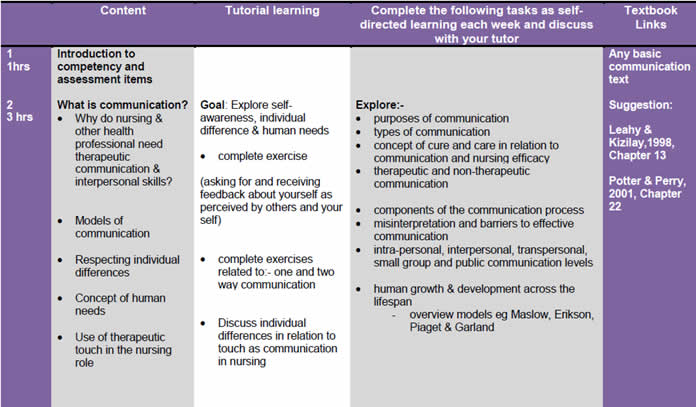
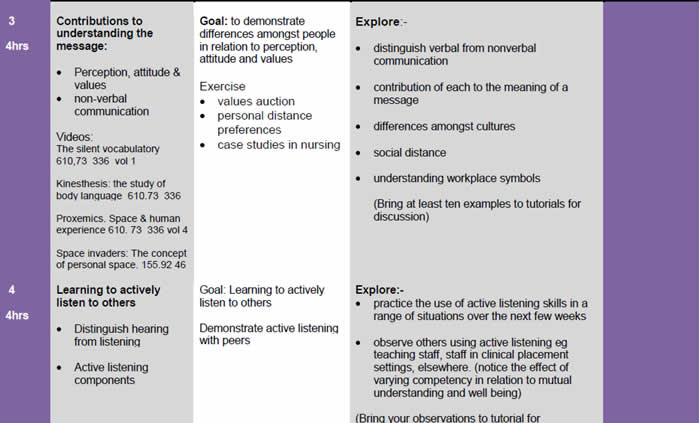
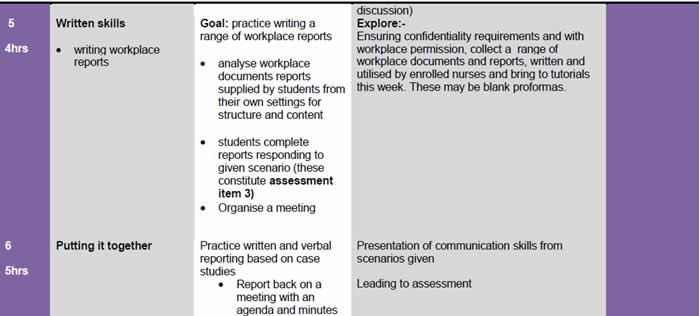
Assessment Tasks
| Name of Assessment Task: Reflection on workplace communication | |||
| Purpose of Assessment Task: Use appropriate communication skills when interacting with a patient and or a colleague to reflect an understanding and respect for individual differences. |
|||
| Evidence provided by: Reflection on critical incident from workplace |
|||
| Pass | NYC | Date | Signature |
| Name of Assessment Task: Compile a portfolio of at least three different simulated workplace reports | |||
| Purpose of Assessment Task: Complete hazard, accident, critical incident, injury, pain observation, falls risk, observation, diet profile, daily fluid balance, behaviour monitoring, continence assessment report |
|||
| Evidence provided by: Written reports submitted by the due date |
|||
| Pass | NYC | Date | Signature |
| Name of Assessment Task: Participate in classroom activities | |||
| Purpose of Assessment Task: Complete hazard, accident, critical incident, injury, pain observation, falls risk, observation, diet profile, daily fluid balance, behaviour monitoring, continence assessment report |
|||
| Evidence provided by: Written reports submitted by the due date |
|||
| Pass | NYC | Date | Signature |
Assessment Coding
PASS
NYC = Not Yet Competent
Professional standards of practice
- SNB code of conduct
- SNB code of ethics
Date of Submission = End of module
Reading list
- Gerrard, B. A., Boniface, W. J. and Love, B. H.1980. Interpersonal skills for health professionals, Reston publishing company, inc.
- Purtilo, R. and Haddad, A. 2002. Health Professionals and Patient Interaction, W. B. Saunders company.
- Berglund, C. and Saltman, D. (Eds.), 2002. Communication for health care, Oxford university press.
- Myerscough, P. R., 1992, .Talking with patients: a basic clinical skill, Oxford university press.
| Co – requisites | Nil |
| Pre –requisites | Nil |
| Recommended Texts | Leahy, J.M. and Kizilay, P.E. 1998, Foundations of nursing practice, W.B. Saunders. |
International Cultural Study
Description
The registered nurse will explore the relationship of culture to language and behaviours in the healthcare arena
| Element | Criteria |
| 1. Cultural Influence on Language | 1.1 Understand the influences of culture on the language we use |
| 2. Culture and Social Behaviour | 2.1 Understand the influences of culture on the social behaviours we adopt |
| 3. Cross Cultural research | 3.1 Explore the research base of culture and cross cultural issues in healthcare |
Module breakdown
This module is broken down into the following components :

This module will integrate with other modules in a cohesive manner to optimise learning and highlight the relationship of all the units from this program. In particular this module will explore the importance of cultural aspects of care.
The assessment strategies will be focused upon the research surrounding culturally sensitive practice development.
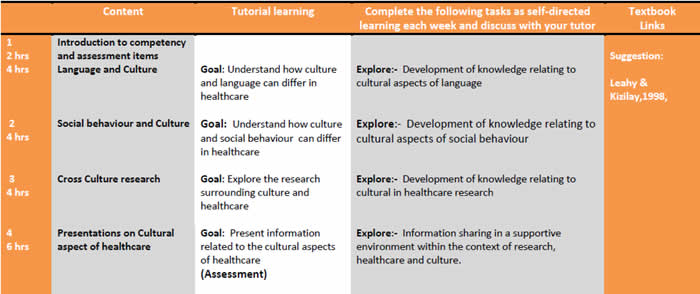
Reading list
| Co – requisites | Nil |
| Pre –requisites | Evaluation of Competence module |
| Recommended Texts | Leahy, J.M. and Kizilay, P.E. 1998, Foundations of nursing practice, W.B. Saunders. Mead (1998) International Management, 2nd Ed Blackwell. |
Other Web Resources which you will find useful
- American Diabetes Association (2005). Recommendations for the Management of diabetes during Ramadan. http://care.diabetesjournals.org/cgi/reprint/28/9/2305.pdf
- Ballard, Roger (n.d.). The implications of cultural diversity for healthcare providers; An anthropological prospective. Retrieved April 7, 2008 from; http://www.arts.manchester.ac.uk/casas/papers/pdfpapers/healthcare.pdf
- Chandler, Bob (n.d.) Cultural sensitivity. Retrieved April 4 2008 from http://www.enotes.com/nursing-encyclopedia/cultural-sensitivity
- Children’s Hospitals and Clinics of Minnesota. (2002). Hmong traditions. Retrieved April 17, 2008 form; http://xpedio02.childrensmn.org/stellent/groups/public/@xcp/@web/@integrativemed/documents/policyreferenceprocedure/web009310.asp
- Galanti, Geri-Ann. (n.d.). Cultural diversity; Concepts. Retrieved April 3, 2008 from; http://www.ggalanti.com/concepts.html
- Hall, Edward (2006). Communication and culture. Retrieved April 2, 2008 from; http://www.onepine.info/mcult2.htm
- Haynes, Judie, (1998-2004). Communicating with gestures. Retrieved April 1, 2008 from; http://www.everythingesl.net/inservices/body_language.php
- Jervis, Nancy (2006). What is culture. Retrieved April 1, 2008 from; http://www.emsc.nysed.gov/ciai/socst/grade3/whatisa.html
- Knott, Patrick. (n.d.). The influence of culture on patient care. Retrieved April 8,2008 from; http://www.rosalindfranklin.edu/cms/clinicalaffairs/ACGME/ACGME_ppt/Knott-CultureRev.pdf
- Loo, Tristan (2006). Non-Verbal dictionary. http://www.synergyinstituteonline.com/detail_article.php?artid=173
- Loo, Tristan (2006). Understanding the language of body distancing. http://www.synergyinstituteonline.com/detail_article.php?artid=99
- Machado, Gerard (2001). Cultural sensitivity and stereotyping. Journal of Multicultural Nursing and Health. Retrieved April 4, 2008 from http://findarticles.com/p/articles/mi_qa3919/is_200107/ai_n8988486/pg_1
- Mental Illness Fellowship of Australia (2005). Effective communication. Retrieved April 9, 2008 from; http://esvc000144.wic027u.server-web.com/pdfs/Effective%20Communications.pdf
- National Institute for Literacy (1998-2005). Communication skills for healthcare professionals. Retrieved April 10, 2008 from; http://slincs.coe.utk.edu/lpm/ky/health_manual/comm_skills1.pdf
- Northeastern College of Business Administration. (n.d.). The importance of effective communication. Retrieved April 7, 2008 from; http://web.cba.neu.edu/~ewertheim/interper/commun.htm
- Srinivasan, Rajeev (2000). Language as a mask of conquest. Retrieved April 7, 2008 from; http://www.rediff.com/news/2000/sep/13rajeev.htm
- Transcultural Nursing (1997-2008). Cultural competence. Retrieved April 4, 2008 from; http://www.culturediversity.org/cultcomp.htm
- Transcultural Nursing (1997-2008). The healthcare provider culture. Retrieved April 7, 2008 from; http://www.culturediversity.org/provc.htm
Assessment Tasks
| Name of Assessment Task: Class Presentation | |||
| Purpose of Assessment Task: Enable practitioners to present information in a supportive setting |
|||
| Evidence provided by: Presentation notes Peer assessment for presentation Tutors evaluation |
|||
| Pass | NYC | Date | Signature |
| Name of Assessment Task: Assignment | |||
| Purpose of Assessment Task: Enable practitioners to demonstrate their understanding of the research related to culture and care |
|||
| Evidence provided by: Completed assignment |
|||
| Pass Level | NYC | Date | Signature |
Assessment Coding
NYC = Not Yet Competent
Pass
Credit
Distinction
Professional standards of practice
- SNB code of conduct
- SNB code of ethics
Date of Submission = End of course
Organisational Behaviour
Welcome to the module which looks at self assessment and critical thinking.
This module creates the underpinning for the other modules in this diploma and is fundamental to the consolidation module. This module provides the basis for your development in both skills and knowledge so it is important that you complete the activities honestly in order to get the most out of the diploma.
There is an expectation that you will complete all the related activities required to prepare for the tutorials as these are the opportunity to put into practice some of the concepts discussed in the lectures. Tutorials are therefore designed to be student focused therefore your input will help towards there success.
Good luck
Description
The registered nurse will be introduced to the concept of different behaviours within an organisation and how to function effectively in the workplace.
| Element | Criteria |
| 1. Organisational behaviours | 1.1 Understand how organisations operate 1.2 Understand yourself in an organisation |
| 2. Values and attitudes within the workplace | 2.1 Understand effective leadership roles 2.2 understanding of groups and group dynamics |
| 3. Human resource management | 3.1 Understand the role of HR 3.2 Managing the critical challenges of the workplace 3.3. Understand conflict resolution models |
Module breakdown
This module is broken down into the following components :

Practitioners are expected to come prepared with the self assessment exercises completed as required.
This module will integrate with other modules in a cohesive manner to optimise learning and highlight the relationship of all the units from this program. In particular this module will focus on organisations and how they operate including the management of resources.
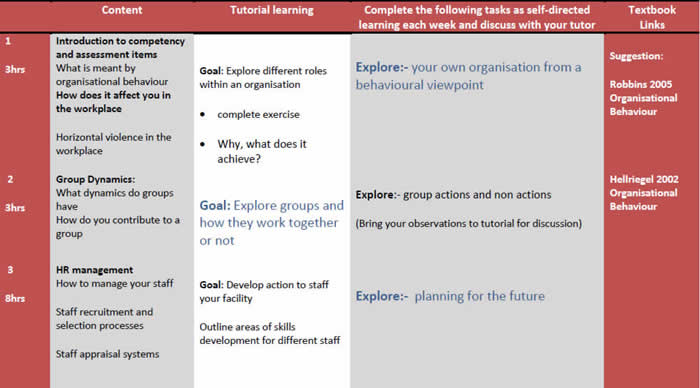

Reading list
| Co – requisites | Nil |
| Pre –requisites | Nil |
| Recommended Texts | Robbins SP 2005 Organisational Behaviour International Edition, Pearson Education Hellriegel D, Slocum Jr JW, Woodman RW 2002, Organisational Behaviour, West Publishing |
Assessment Guidelines
The purpose of this assignment is to gain an understanding of the current literature surrounding different organisational behaviours. You then need to relate this to your own workplace to demonstrate that you understand how the literature supports what you find.
The assignment will be about 1500-2000 words in length.
It should show evidence of reflection on your own experiences, which are supported by the literature.
You should use a recognised referencing system.
Assessment Tasks
| Name of Assessment Task: Written Assignment | |||
| Purpose of Assessment Task: Demonstrate understanding of organisations and how they operate on the larger scale |
|||
| Evidence provided by: Reflection from workplace on practices related to organisations which includes reference to the literature |
|||
| Pass | NYC | Date | Signature |
Topic Suggestions
Interviewing staff
Staff Appraisal systems
What do patients think about ICT
Horizontal violence in the workplace
Assessment Coding
NYC = Not Yet Competent
Pass
Professional standards of practice
- SNB code of conduct
- SNB code of ethics
Simulation Crisis Management
Description
The registered nurse will build upon existing skills related to the management of critical situations in general and specialist areas of practice.
There will also be a focus on the first aid management of situations to enable practitioners to offer assistance outside the workplace, with confidence
| Element | Criteria |
| 1. First Aid | 1.1 First aid concepts and theory 1.2 Practical application |
| 2. Resuscitation | 2.1 Community CRP 2.2 BCLS |
| 3. Ward based emergencies including the emergency department | 3.1 What constitutes and emergency 3.2 What should I do 3.3. What do I need to know to manage effectively |
| 4. Disaster planning | 4.1 What constitutes a disaster 4.2 What is disaster planning |
Module expectations
Practitioners are expected to come prepared having completed the relevant reading to enable active participation.
This module encourages practitioners to participate actively in the practical application of learning.
Assessment will be in 3 parts which are identified on page 5 below.
Assessment Coding
NYC = Not Yet Competent
Professional standards of practice
- SNB code of conduct
- SNB code of ethics
- Guidelines for registered nurses regarding the boundaries of professional practice 2001
This module will integrate with other modules in a cohesive manner to optimise learning and highlight the relationship of all the units from this program. In particular this module will inform the final module Consolidation of Knowledge and Practical Skills Training.
Date of Submission = End of module
Reading list
| Co – requisites | Nil |
| Pre –requisites | Nil |
| Recommended Texts | Leahy, J.M. and Kizilay, P.E. 1998, Foundations of nursing practice, W.B. Saunders. deWit S, 2005, Fundamental concepts and skills for nursing, (2nd Edition) Elsevier Saunders, Philadelphia First Aid Manual, 2008, DK, London |
Module breakdown
This module is broken down into the following components :


Assessment Tasks
| Name of Assessment Task: Administer First Aid | |||
| Purpose of Assessment Task: Demonstrate the use of first aid skill in different situations |
|||
| Evidence provided by: Skills assessment using criteria based checklists Written test to demonstrate knowledge base |
|||
| Pass | NYC | Date | Signature |
| Name of Assessment Task 2: Administer CPR in the community and hospital setting | |||
| Purpose of Assessment Task: Demonstrate the use of CPR and BLS skill in different situations |
|||
| Evidence provided by: Skills assessment using criteria based checklists to enable demonstration Written test to demonstrate knowledge base |
|||
| Pass | NYC | Date | Signature |
| Name of Assessment Task 3: Action in a ward based emergency | |||
| Purpose of Assessment Task: Demonstrate the knowledge required to act effectively in a ward based emergency |
|||
| Evidence provided by: Written evidence of knowledge through MCQ paper |
|||
| Pass | NYC | Date | Signature |
